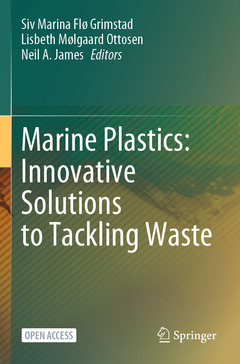Marine Plastics: Innovative Solutions to Tackling Waste, 1st ed. 2023
Coordonnateurs : Grimstad Siv Marina Flø, Ottosen Lisbeth Mølgaard, James Neil A.

This open access book reflects aims of the Blue Circular Economy (BCE) project, which focused on small and medium-sized enterprises (SMEs) aiming to create value using circular economy concepts related to products and services within fishing gear recycling in the Northern Periphery and Arctic (NPA) area. Cluster establishment and operation were carried out in collaboration with academia, industry and government agencies following a triple-helix approach.
Discarded fishing gear constitutes a large part of marine plastics. Preventing future discharge of fishing gear into the ocean is a vital step in combating plastic pollution. Circular economy is one of the tools in the European Green deal, targeting waste minimisation. Closing the loop for waste fishing nets by transferring them to a resource could be a solution for preventing discharge at sea: exploring this opportunity is at the core of this book.
Siv Marina Flø Grimstad is Associate Professor at the Department of International Business (IIF), Norwegian University of Science and Technology (NTNU). Siv Marina was Project Coordinator for Blue Circular Economy, a €1.7-million project funded by the EU’s Northern Periphery and Arctic Programme. This project aimed at developing sustainable solutions to marine plastic waste a litter and was a finalist in the RegioStars 2020 Awards. Currently, she is involved in Circnets a NPA-project which aims to make a Blueprint for the collection, treatment and reuse of EOL fishing gear for the NPA-region and to prepare the stakeholders involved in fishing business for the implementation of these legislative changes. Her research interests include international/global marketing, SMEs’ internationalisation, international entrepreneurship, circular economy, sustainability and corporate social responsibility.
Lisbeth M. Ottosen works at the Department of Environmental and Resource Engineering (DTU Sustain), Technical University of Denmark. Her research focus is on the reuse and recovery of resources in support of the transition towards a circular economy. Her major research lines are: (I) non-destructive testing for documentation of material quality in relation to the reuse of building components, (II) use of secondary resources in the production of new construction materials (mainly concrete and bricks) and (III) electrochemical processes for recovery of elemental resources such as phosphorous and heavy metals from particulate materials (ashes, soils, sludges and sediments). She has participated/led many national and international projects in the area between civil and environmental engineering. Lisbeth has a M.Sc. in civil engineering and received her Ph.D. within environmental technology. She is Author of more than 190 WoS indexed journal papers.
Neil James is Research Fellow based at the Environmental Research Institute in Thurso, Sco
Date de parution : 08-2023
Ouvrage de 274 p.
15.5x23.5 cm



